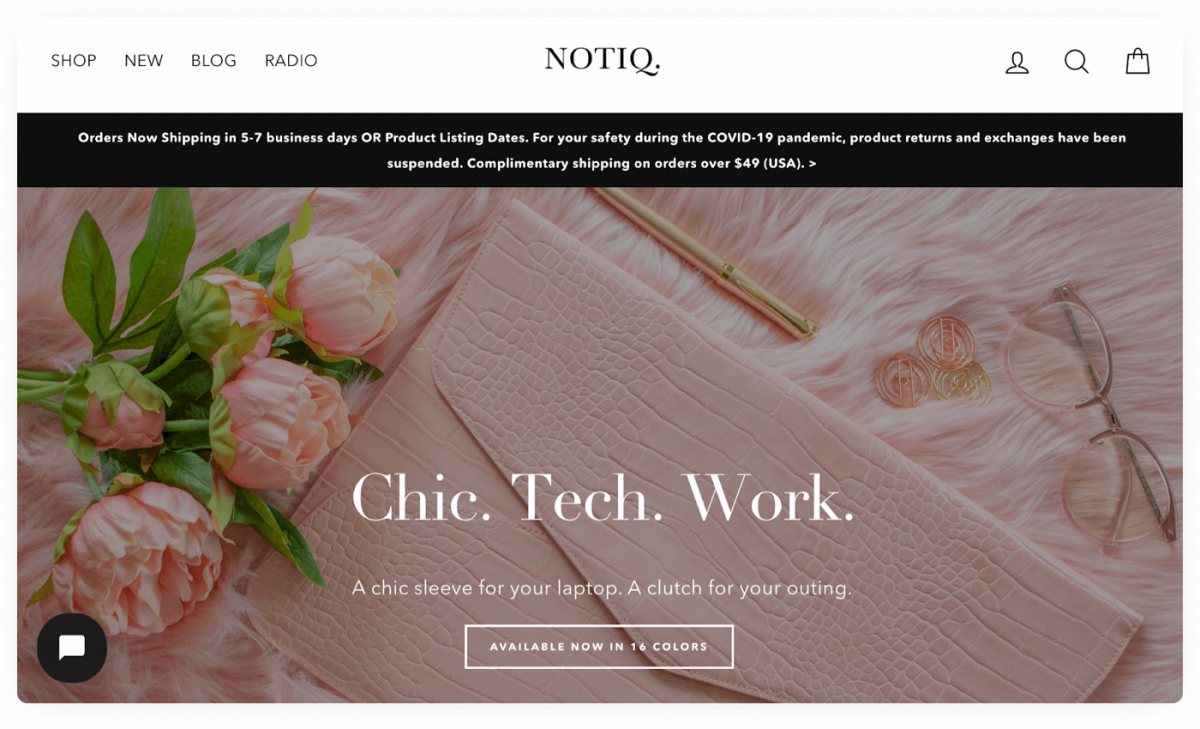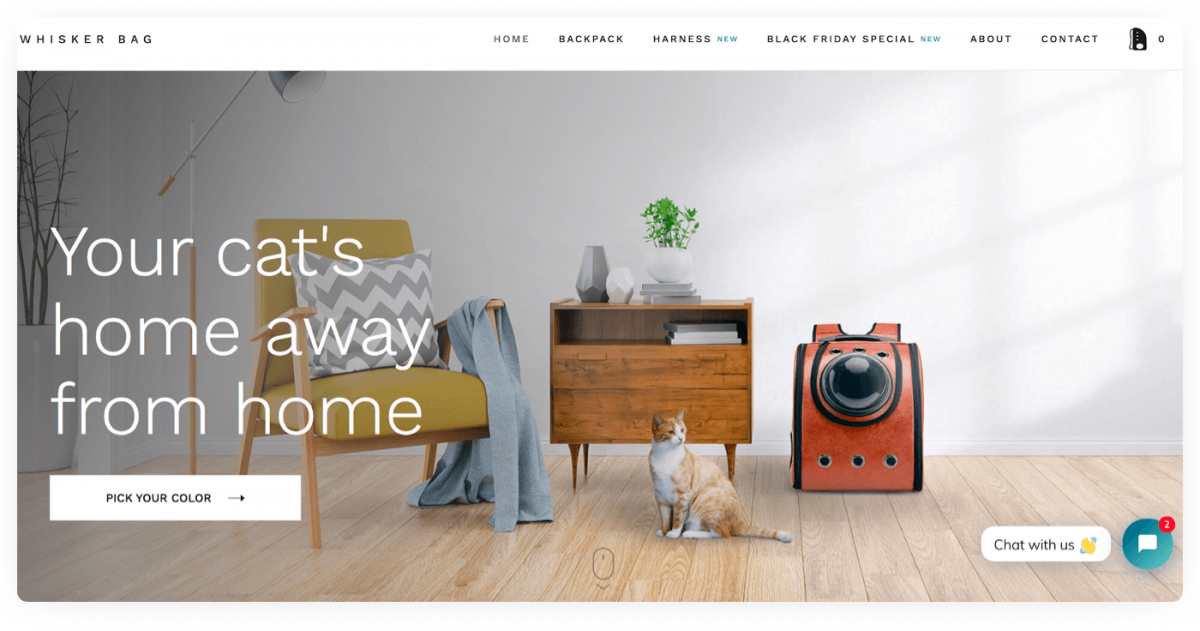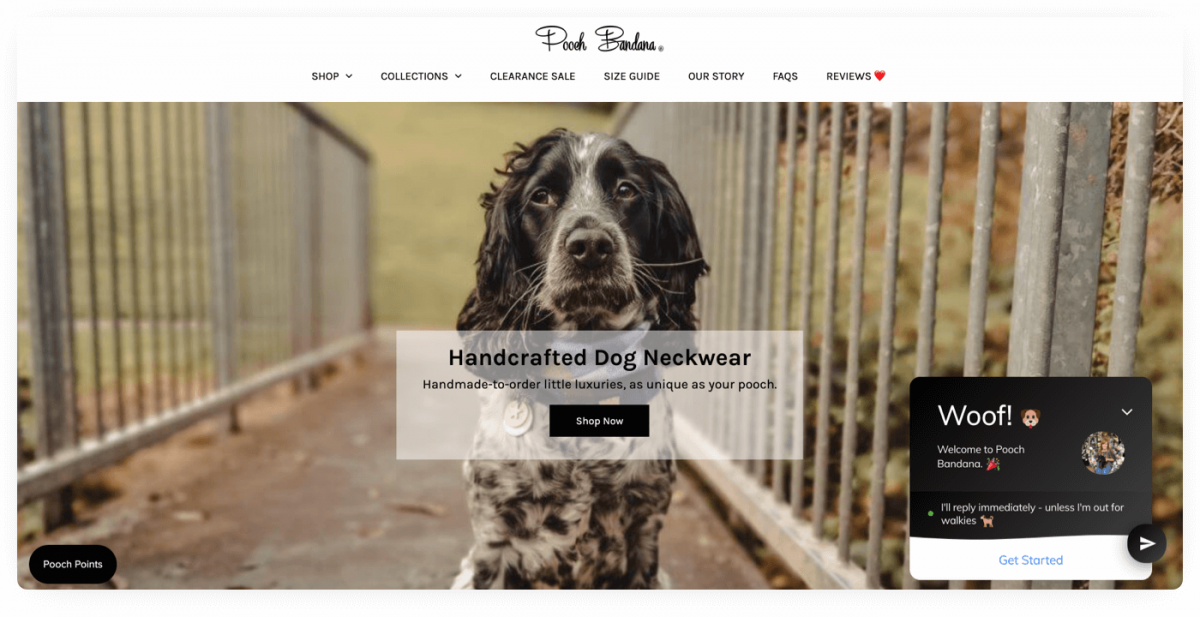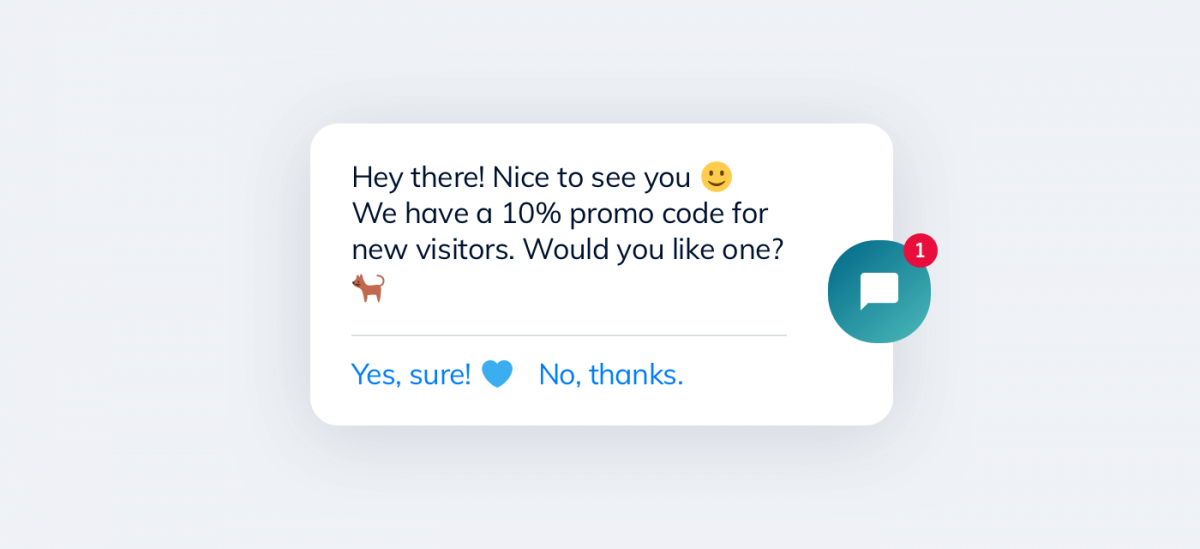Want to start an online business? So do many other aspiring entrepreneurs.
But the sad truth is—
About 90% will fail in the first 120 days…
And that’s a good thing.
Why?
Because after reading this guide you’ll know exactly what it takes to join the 10% of successful online business owners.
Let’s get you ready to get it up and running.
Get a future-proof live chat app that will grow with your online business
1. Find the right product
Before you start selling anything, you must decide on products and range. This is arguably one of the most important decisions to make before starting an online business.
And you must be quite specific, too. Why? An online clothing store can sell such specific items as shoes, underwear, cycling clothing, or maternity wear, for example. But it can also have multiple product categories and offer a wide variety of products. What you want to sell will impact all the subsequent steps.
Need product ideas? Since we have a dedicated article on the best things to sell online, here’s just a couple to consider:
- Bluetooth speakers
- Pet products
- Matcha powder and tea
- Yoga & pilates mats and accessories.
Want to sell professional services rather than products?
Define the main value proposition for customers. Basically, come up with a goal that your online business helps with, e.g., “eCommerce store design without hidden costs,” “Interior design services: transform any room in your home at your budget.”
2. Do a competitive analysis
Competitive analysis is a strategy where you define your most successful competitors, their products, and marketing strategies. The results will help to find market gaps and effective marketing methods for your business online.
To do a competitive analysis:
- Find your competitors and products they offer
- Research their marketing strategies and selling tactics
- Determine their sales channels
- Perform a SWOT analysis for each major competitor
Ultimately, you’ll discover the best practices to sell your products. At this point, it’s time to test them and get a website for your new online business.
Never done a competitive analysis before? Read these detailed guides:
- What’s a Competitive Analysis & How Do You Conduct One?
- How to Do a SWOT Analysis for Your Small Business (with Examples)
3. Build your website
Starting a business online requires a good-looking website. One that sells, actually. To build it quickly, you might need a website platform.
These are the best options for both online stores and freelancers:
- Shopify (basic plan for $29/mo). The most popular online store builder for small businesses. Easy to use and set up.
- WordPress (free). An affordable option for freelancers and new businesses with decent functionality and numerous website templates.
- Wix (free plan, paid plans start at $12). Offer hundreds of well-designed website templates and conversion features.
- BigCommerce ($29.90/mo). Designed to help create eCommerce stores and sell more with rich sales features.
Each of these platforms gives you an option to start selling. Wix and WordPress are better for making online business websites for freelancers, while BigCommerce and Shopify are more suitable for shop owners. You can also set up a freelance recruiter contract template on your website.
If you think that starting your own online business website is complicated, you’re wrong. Thanks to drag-and-drop interfaces it’s dead easy. Plus, you can start your own business online with no money—WordPress and Wix come for free.
Get help with building an online business with the right platform:
- Shopify vs. Wix: Which Is Better for Ecommerce in 2022?
- How to Use WordPress to Make a Website [Guide for Beginners]
- BigCommerce vs Shopify – Which One Should You Choose?
- How to Build an eCommerce Website
- 10 Examples of Successful WordPress eCommerce Stores
4. Add plugins
So, you’ve chosen a website platform.
Now it’s time to give your internet business a couple of enhancements (a.k.a. plugins, extensions, or apps). You’ll need them to sell more, rank high on Google, generate valuable leads, and serve all your customers.
Must-have plugins for a new business website include:
- Customer review plugin to add reviews to product pages
- SEO plugin for website optimization
- Live chat plugin for quick customer service
- Abandoned cart plugin to recover sales
- Chatbot plugin for lead generation and customer support
- Upselling and cross-selling plugin for automatic product recommendations.
Wondering how to start eCommerce sales with plugins? Check out these resources for the best options:
- Top 21 BigCommerce Apps to Grow Your Business [2022]
- 12 Best WooCommerce Plugins & Extensions [Top Free Included]
- 14 Best Shopify Apps to Get More Customers in 2022
- 15 Best WordPress Ecommerce Plugins [Reviews for 2022]
- 5 Shopify Abandoned Cart Apps [+Abandoned Checkout Recovery Guide]
5. Launch your website
At his point, you’re literally one click away from your own online business. All you need to do to start selling is to launch it!
If you still need a bit of encouragement, here are several successful small business website examples:
Notiq
An elegant Shopify-based store and an excellent example of a website-based business. Vivian Jokotade, the founder, says they were able to increase their sales from $8,000 to $30,000 thanks to live chat—a major takeaway for new online stores.

Want to create an elegant store with Shopify, too? This will help:
Whisker Bag
Whisker Bag combines easy navigation, stunning product photos, and superb customer service tools. It’s a great source of inspiration for new business owners selling a limited range of products.
Read the full story behind Whisker Bag: How We Turned Cat Travel Bag Idea Into a $100K/Year Side Business

Pooch Bandana
An excellent example of how to make an online business with a unique product and website. Pooch Bandana was off to a great start thanks to chatbots—an idea to answer more customer questions with a limited staff.
Read the full story: How My Dog Accessories Store Doubled Sales with Chatbots (in 7 Days)

Read more: Explore the essential ecommerce website launch checklist.
6. Make your first sale
As Notiq, Whisker Bag, and Pooch Bandana show, live chat could help you make the first sale via your online business.
How?
They allow you to be proactive.
You can easily interact with your website visitors in real-time and message them instantly. For example, you can offer them a discount while they’re viewing a product page.
It’s kind of like having a shop assistant nearby in an online environment.

Chatbots can take you one step further.
Imagine you have 100 visitors at the same time. One chatbot can serve them all. At the same time.
It’s easier to score your first sale this way, isn’t it?
A chatbot can share a discount, free shipping, or other incentives automatically.
For instance, this one offers a promo code for a 10% discount in exchange for a customer’s email address.

Plus, chatbots will help build an email lead base.
Even if a visitor doesn’t buy anything from you initially, you can engage them later on with a newsletter! Another affordable and effective way to build your online business.
How to do online business with live chat, chatbots, and email marketing:
7. Market your new business
You’ve already researched marketing strategies at the competitive analysis stage. But there can never be enough marketing. The best strategies to try when starting an internet business include:
- Email marketing. Send marketing emails to your existing customers to keep them updated on sales, discounts, special offers, loyalty programs, etc.
- Facebook advertising campaigns. Advanced targeting options allow you to show ads to your target customers
- Content marketing. Start with writing blog articles that have value for your customers—it’ll be an organic way to build a reputation
- Social media. Share product images, blog articles, customer reviews, and announcements on Instagram, Facebook, etc.
- Free trial or consultation. A method to attract leads for freelancers and service-based businesses.
Remember that there’s no magic strategy to making an online business. Each option can help your business grow if your marketing appeals to the right people. So knowledge of customer needs is essential.
You can start a blog with a free WordPress or YouTube account and blog or vlog about something that interests you (cooking, travel, small business, auto repair, you name it).
These resources can help you with marketing your online business:
- A-Z Guide to a Killer Lead Generation Strategy for Small Businesses
- 8 Effective Tactics to Improve Your Shopify Marketing Strategy
- A Quick Guide to Consumer Behavior [+ Examples]
- 7 Best Email Newsletter Templates [Free Examples]
- How to Build an Email List From Scratch
- 6 Simple eCommerce Customer Segmentation Strategies to Increase Your Sales
- 10 Best Email Marketing Software Tools & Services
- A Quick Guide to Relationship Marketing [Best Ideas & Examples]
- What Is Product Marketing? [Strategy + Examples]
- What Is Marketing Automation and How Can It Help Your Business?
- 13 Best Marketing Automation Software & Tools Available in 2021
- 16 Black Friday Marketing Strategies and Sales Ideas
- What is Inbound Marketing? [Definition & 15 Tactics]
8. Measure business success
How to start an online business and make it last? Monitor its health with metrics, and make the necessary adjustments. Regardless of the industry, business owners should have these metrics to measure success:
- Conversion rate. This is the percentage of visitors on your website who end up taking the desired action, e.g. buying, subscribing for a newsletter, etc. The average conversion rate across industries is between 2% and 5%
- Customer satisfaction score. Use surveys and reviews to check how many customers are satisfied (and not) after buying from your business
- Customer acquisition channel performance. Keep track of where your leads and customers come from (social media, Google, email, ads, etc.) and focus on the best ones
- Employee satisfaction score. Employee satisfaction translates into customer satisfaction, so survey your staff to find how to make the workplace better.
Of course, monitoring your business is only half the battle. As your company grows, consider implementing a governance framework to ensure clear decision-making, accountability, and scalability. A solid framework helps maintain focus and structure, especially as your team and operations expand.
Know how your business is doing with these resources:
- 6 Steps to Measure Customer Satisfaction [Metrics, Pros & Cons]
- 7 Ideas to Increase eCommerce Conversion Rate to Try Today
- 6 Tips to Use Analytics For Effective Email Marketing
- Customer Satisfaction Survey: 100+ Sample Questions & Guide
BONUS: 10+ Simple Online Business Ideas
Still wondering how to start an online business with no money (or not a lot) and what to sell? Head straight to one of our dedicated guides:
- 15 Best Small Business Ideas to Start in 2022 [List]
- 8 Business Ideas for College Students [+How to Start]
Here’s a quick overview of business ideas with minimum investment and decent returns.
1. Dropshipping store
A popular way of starting an eCommerce business from scratch that eliminates the costs of storing inventory. The industry is booming: the global dropshipping market is expected to grow by 28.8% annually.
2. Web development
How to start an online business from home? Creating and designing websites is a popular way. Web development skills are in high demand, especially now with the rise of eCommerce due to the pandemic.
The Bureau of Labor Statistics says the employment of web developers will grow by 8% until 2029, suggesting a higher demand for their services.
3. Niche ecommerce seller
An online store selling clothes, dog accessories, luxury planners, vegan food—there’s an audience for almost everything. You’ll need to figure out a way of reaching it with relevant marketing, though.
4. Remote customer support agent
Answer emails or telephone calls to help your client’s customers remotely. A flexible business option that helps to work from home and avoid commuting.
5. Social media consulting
Facebook statistics say that over 80 million small businesses are using the platform—many of them need consulting to reach specific audiences. So, setting up an online business that provides social media consulting services is a good idea.
6. Virtual assistant
Another good way of starting an online business from home. Virtual assistants help individuals like business owners manage their professional and personal lives remotely.
7. Blogging
Get a free WordPress or YouTube account and blog or vlog about something that interests you (cooking, travel, small business, auto repair, you name it).
You can earn between $500 and $2,000 in your first year if you commit part-time (with affiliate links and ads). Full-time bloggers make up to $200,000 per year.
8. Handmade goods seller
Consider yourself a crafty person? How about running an online business to monetize these skills, then?
Starting a small online business in this case means getting a simple website. Getting a website will help avoid the competition on handmade art marketplaces; Etsy alone, for example, has 46+ million sellers.
9. T-Shirt store owner
Been there, done that. But did you get the t-shirt? No? Well, maybe there were none available. Have you considered getting into the t-shirt business? The global custom t-shirt printing industry is forecast to reach $10 billion in five years from now.
Get blank t-shirts from a supplier, create designs, and start an online store!
10. App development
Here’s how to start a business online for people with some coding skills: build a mobile app. The market of apps is booming—in fact, the average smartphone owner uses about 30 apps per month, so you can get paying users quickly.
11. Career coaching
Have some experience in HR? Start an online career coaching business and help people build their careers, prepare for interviews, and get better jobs.
More useful resources for business ideas:
- How to Sell Art Online
- 20 Best Places to Sell Online [Platforms & Websites to Sell Items]
- How to Sell on Facebook Marketplace: Beginner’s Tips for 2022
Want to learn how to start an eCommerce business from the experiences of others?
Here are a few case studies to help you.
- How I Made $23,000 in High-Ticket Sales After (Almost) Going Bankrupt A case study of a business owner who used chatbots to promote their high-ticket dropshipping business
- See how a tuxedo rental company, achieved 85% customer service automation with AI chatbots
- How to Respond 30x Faster and Never Miss a Big Client (+Free Tools) Read about the experience of a digital transformation agency that managed to increase their lead generation by five times.
Key takeaway
Starting an online business is an exciting and challenging experience. In the upcoming months, you’ll be learning how to make an online business profitable with different marketing strategies and techniques.
- Find a product to sell at your online store
- Investigate the competition to know how to beat it
- Get an eCommerce website for your business
- Add plugins to give your business website more functionality
- Launch your website
- Use proven sales tools to get the first order
- Invest in marketing your business
- Monitor your business’s performance.
That’s basically it!
And remember—you can start an online business for free. With so many free website platforms and apps available, there’s no need to pay big bucks. Good luck!

